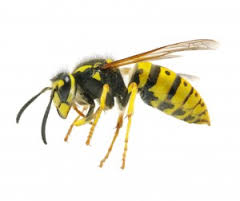WASPS &
YELLOW JACKETS
Throughout the centuries humans have learned to fear wasps and with good reason. When disturbed, wasps render a quick and painful response. After stinging a victim, wasps keep their stingers intact, enabling them to repeat the attack of their target multiple times, while alerting the rest of the colony to join in.
 |
Bald Faced Hornets nest in tress and shrubs. They rarely sting humans and their main food source is nectar. They also prey on yellow jacket wasps. |
Throughout the centuries humans have learned to fear wasps and with good reason. When disturbed, wasps render a quick and painful response. After stinging a victim, wasps keep their stingers intact, enabling them to repeat the attack of their target multiple times, while alerting the rest of the colony to join in.
Hornets,
Yellow-jackets, Polistes, Mud daubers and Cicada killers are all wasps,
considered a beneficial insect because they feed on other destructive insects
around the home grounds and in gardens.
No matter how beneficial wasps are to the environment they also attack us, so their nests should be destroyed when they build them close to where we live and children play.
 |
Beautiful designed paper wasp nests are often close to where humans live and play. |
No matter how beneficial wasps are to the environment they also attack us, so their nests should be destroyed when they build them close to where we live and children play.
The type of wasp can be identified by the nest they build. Polistes, also known as paper wasps, and Hornets build their nest above ground in trees, shrubbery and under eaves.
 |
These wasp and hornet nest are most dangerous to us when they fall from trees. |
Mud daubers nest under eaves, porch roofs and behind shutters, but not in trees.
 |
Destroy nest only at night or before dawn when the wasp are less able to quickly respond and leave the area immediately |
Cicada Killer Wasps are solitary creatures and nest in the ground.
Left alone they will not usually attack humans.
 |
Cicada Killer Wasp become a nuisance when they nest in large numbers on a lawns although they rarely sting humans. |
Yellow-jackets mostly nest in the ground but will take advantage of many other nesting sites they find.
Yellow jackets are one of the most feared wasps in our area. In the early summer, yellow jackets feed mainly on insects, but as the season changes so does their diet. By September yellow jackets feed on meat which makes them an unwelcome and aggressive visitor at picnics and BBQ’s.

Whatever you do, don’t spray a nest during the day when the colony is on the alert to defend itself, especially if children, pets and other humans are nearby.
Warn everyone to
stay away and if possible rope off the area. Then make plans to spray the nest
at night when wasps are least able to defend themselves. Before spraying, make
sure you have a quick and safe escape route from the area.
 |
Black and Yellow Mud Dauber's are non aggressive to humans |
For more
information on this important topic read Rutgers Cooperative Extension Fact sheet
# FS212, ‘Wasps and Their Control’.
You can also
call your local cooperative extensive office for more details.
Wishing everyone a safe and happy autumn,
James
